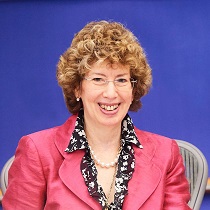Kathy Oliver

Chair and Founding Co-Director, International Brain Tumour Alliance (IBTA)
Kathy Oliver is Chair and Founding Co-Director of the International Brain Tumour Alliance (IBTA), a global network established in 2005 as a dynamic worldwide community for brain tumour patient organisations and others involved in the field of neuro-oncology. The IBTA campaigns for equitable access to brain tumour therapies; encourages the establishment of brain tumour patient/caregiver support groups in countries where they don’t yet exist; and raises awareness of the challenges of this devastating disease.
Kathy is involved in cancer patient rights-based advocacy and is a co-author of “The European Cancer Patient’s Bill of Rights” (2014), “The European Code of Cancer Practice” (2020) and “The Brain Tumour Patients’ Charter of Rights” (2020).
She is a frequent speaker at international cancer and neuro-oncology conferences and participates in high-level, multi-stakeholder projects and committees focussing on patient reported outcomes, quality of life, treatment guidelines, rare cancers, regulatory matters and supportive and palliative care. She has authored/co-authored a wide range of journal papers, book chapters and magazine articles about brain tumours, patient advocacy, regulatory matters, COVID-19, supportive care and other relevant topics. She is a EUPATI Fellow (European Patients Academy); a faculty member at the College of the European School of Oncology (ESCO); Co-Chair of the European Cancer Organisation’s Patient Advisory Committee and a steering committee member at EURACAN, the European Reference Network for rare adult solid tumours.
Kathy’s son, Colin, was diagnosed with a brain tumour in 2004 at age 24 and passed away, at age 32, in August 2011. Kathy cites her son’s “incredible courage, determination and fortitude” as the driving force and inspiration behind her involvement in the international brain tumour and rare cancer communities.
Updated: August 2025

